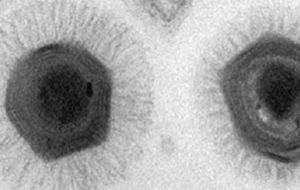MercoPress. South Atlantic News Agency
Largest virus ever discovered pulled off the coast of Chile
 Megavirus chilensis, it is 10 to 20 times longer than the average virus
Megavirus chilensis, it is 10 to 20 times longer than the average virus The largest virus yet discovered has been isolated from ocean water pulled up off the coast of Chile. Called Megavirus chilensis, it is 10 to 20 times longer than the average virus.
It just beats the previous record holder, Mimivirus, which was found in a water cooling tower in the UK in 1992. Scientists tell the journal PNAS that Megavirus probably infects amoebas, single-celled organisms that are floating free in the sea.
The particle measures about 0.7 micrometers (thousandths of a millimetre) in diameter.
“It is bigger than some bacteria,” explained Professor Jean-Michel Claverie, from Aix-Marseille University, Marseille, France. “You don't need an electron microscope to see it; you can see it with an ordinary light microscope,” he told BBC News.
Viruses cannot copy themselves; they need to invade a host cell if they want to replicate.
Like Mimivirus, Megavirus has hair-like structures on its exterior that probably attract unsuspecting amoebas looking to prey on bacteria displaying similar features.
A study of the giant virus's DNA shows it to have over a thousand genes, the biochemical instructions it uses to build the systems it requires to replicate once inside its host.
In the lab experiments conducted by Professor Claverie and colleagues, in which they infected fresh-water amoebas, Megavirus was seen to construct large trojan organelles - the “cells within cells” that would produce new viruses to infect other amoebas.
“Everything is initiated from a single particle, and then grows and grows to become this virion factory,” explained Professor Claverie. “That's why it needs all these genes.”
Megavirus was found off the coast of Las Cruces, central Chile. It was recovered as part of a general trawl in the ocean for biology of interest.
“This is a new way of doing virology,” said Professor Claverie.
“Previously, we only discovered viruses because they caused disease in humans, or animals and plants. But now we are initiating what might be called environmental virology and we are looking for viruses everywhere.
”You just go to lakes, seas and oceans and pick up the water, and then you filter it, and try to rescue the virus by co-cultivating it with some potential host.”
More generally, there is interest in ocean viruses because they have a major influence on populations of plankton, the microscopic organisms that form the base of many marine food chains. And when they kill plankton, viruses are also helping to regulate the planet's geochemical cycles as the dead organisms sink into the deep, locking away their carbon for aeons. (BBC).-




Top Comments
Disclaimer & comment rules-

Read all comments“when they kill plankton, viruses are also helping to regulate the planet's geochemical cycles as the dead organisms sink into the deep, locking away their carbon for aeons”
Oct 10th, 2011 - 11:37 pm 0Heavy stuff, these big bugers!
Commenting for this story is now closed.
If you have a Facebook account, become a fan and comment on our Facebook Page!